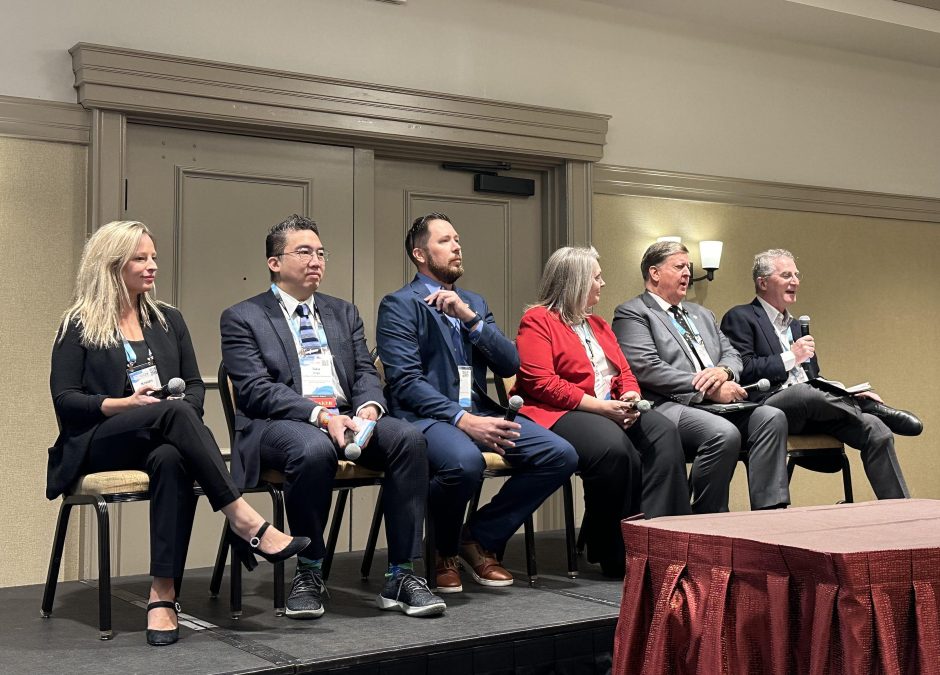Federal data management career path needs improvement, CDO Council vice chair says

HERSHEY, Pa. — A clearer trajectory for data professionals in government could address the issue of the data field being a temporary career stop, said Rob King, the vice chair of the Chief Data Officers Council.
Speaking to FedScoop on the sidelines of ACT-IAC’s Imagine Nation event last week in Hershey, Pa., King described issues with the human resources structure of data positions in government, which are particularly important right now as agencies look to meet the AI moment.
Specifically, he pointed to limitations of the existing data-related job series — occupational groups within the U.S. government define competencies and requirements for positions — and a need to improve that track.
“We have to professionalize the data management function, and there is no current path defined today,” said King, who is also the Department of Energy’s chief data officer. King said he’s watched people come into the federal data management space with passion, but because there isn’t a defined path or dedicated job series, “it’s a pit stop in their career.”
While existing series for data scientists (series 1560) and operational research series (1515) include some data professionals in government, King said those roles are “at the end of the data life cycle.”
Before data gets to those positions, it must be tagged and stewarded, and technical, functional and semantic layers have to be built, he said. But there isn’t currently a job series that defines core competencies for positions like data practitioners, taggers, stewards, engineers or governance leaders.
“These are foundational roles that we need to be successful as a data profession, especially as we find ourselves in the AI tsunami,” King said.
AI tools depend on large amounts of data to build their virtual brains, but already agencies have cited data as a barrier to being able to implement the technology responsibly. Having a good data workforce will likely be important for those efforts as they move forward.
King said government leaders and decision makers need to “understand that data bookends AI.”
“We can’t achieve the requirements laid out in the various memos and policies if we don’t focus on the data that informs our AI models,” he said.
Some ongoing work may address the career path issue. The Office of Personnel Management is looking at restructuring the job series for IT management (2210), which the CDO Council is participating in. King said the council is hoping to get some of the data positions he described into that series as “parentheticals” but said it’s “too early to tell” whether they will be included.
“I think that could be a square peg in a round hole, but let’s see where it goes over the next year,” King said. Specifically, he said he doesn’t believe that those data positions belong in IT management because data is a function that sits across policy, business and mission.
King initially mentioned the challenges for the data career track on a panel titled “Data Analytics & Big Data: Invest Now Play Later.” While speaking on that panel, OPM Chief Data Officer Taka Ariga also referenced the work to restructure the IT management job series, calling it a “skill-based hiring” effort and noting that thinking through the data profession is “on our docket.”
“I absolutely agree that there needs to be a more nuanced view in terms of how we’re hiring data professionals, whether they’re data engineers or AI specialists,” Ariga said.
Speaking to FedScoop after the panel, Ariga pointed to some of the ongoing work at OPM to improve hiring for STEM professionals and tapping into programs focused on getting technologists in government positions.
Ariga said the agency has a “strategic focus around early talent” and getting early career professionals to the federal government space. That work includes making sure applicants understand the impact of government work and highlighting flexibilities like being able to move around to different agencies.
During the panel discussion, King noted that data issues in government are a “culture problem,” and several other officials also acknowledged lack of data professionals in government as an issue.
Charlotte Phelan, assistant commissioner in the Office of Strategy and Innovation at the General Services Administration’s Federal Acquisition Service, agreed with King, saying it’s a culture problem “because we don’t have practitioners.”
Jamie Holcombe, chief information officer of the U.S. Patent and Trademark Office, pointed to recruitment issues, arguing the government lacks incentives for younger workers.
“We have a real problem. OPM can verify with data that our young folks are not joining the federal government,” he said. Holcombe said people need to be able to move in and out of the commercial space and government “to bring the best of the government into the commercial world.”
But King said the government also has a lot to offer those younger professionals, like mission and work-life balance.
“I see a workforce coming out of the universities in the last 10 years who are highly inspired by mission,” he said. He added later: “What we need to figure out is how to give them mobility in the government so that they can continue to learn.”






